6 - Improving the System
Published online by Cambridge University Press: 03 December 2009
Summary
In Jonathan Swift's imaginary country of Lilliput described in Gulliver's Travels, the Emperor chose new public officials by staging a “Dance on the Rope.” Political aspirants would jump on top of a rope, and whoever jumped the highest without falling off was awarded the new office. Although this criterion for electoral performance was arbitrary and bore little relationship to the duties of the office, it was a system that was open, clear, and egalitarian in the way it operated. Anyone could seek the office, and at the end of the “campaign,” there were no disputes over who had won.
While democracies would not want to emulate this selection process, our contemporary system leaves a lot to be desired from the standpoint of democratic elections. Americans remain quite cynical about their political process and unhappy with the style and substance of campaigns for public office. Our empirical analysis shows there is little consistent evidence that proposed reforms have improved campaign discourse or conduct in the current period. Based on our findings, there is more support for the doubts of reform “skeptics” than that for the hopes of “optimists.”
In this chapter, we step back from the details of our research and address three fundamental questions about campaign reform. Can the kinds of reforms that have been proposed recently have a positive effect? And, whether by those means or others, what is the likelihood that we will see system-wide change in the quality of information politicians provide when they campaign for reelection?
Information
- Type
- Chapter
- Information
- Evaluating Campaign QualityCan the Electoral Process be Improved?, pp. 94 - 116Publisher: Cambridge University PressPrint publication year: 2007
